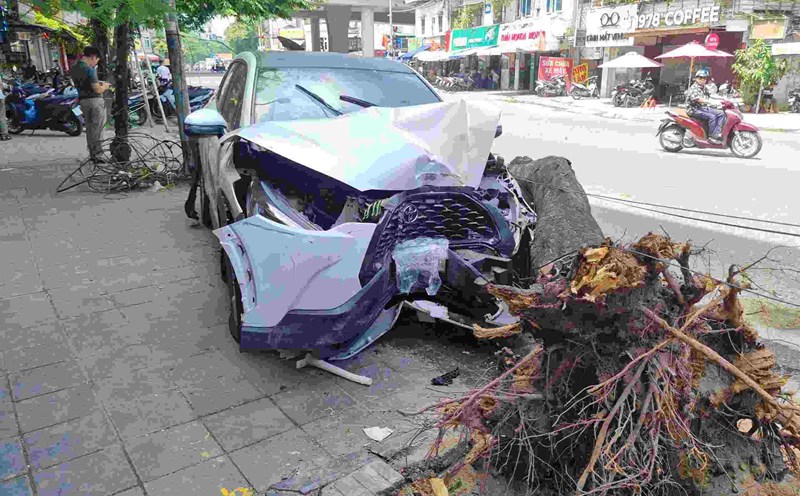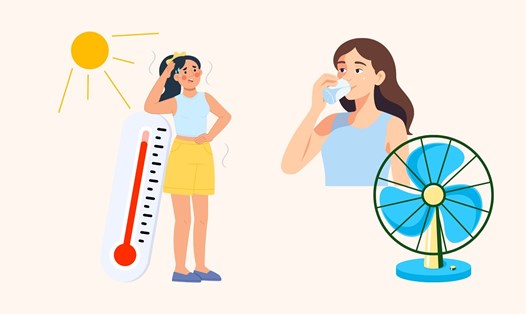At the Intensive Care - Anti-Poison Department, Phu Tho General Hospital provided emergency care to patient N.T.H (65 years old, residing in Cam Khe, Phu Tho) who suddenly fainted while working in the fields in harsh conditions. The patient was taken to the regional Medical Center for initial emergency care with a diagnosis of heat stroke and was quickly transferred to Phu Tho General Hospital.
At the time of admission, the patient was in a deep coma, on a ventilator, with blood pressure dependent on vasopressors, fever of 39 degrees Celsius. Doctors in the Intensive Care - Anti-Poison Department quickly implemented active treatment measures such as: Compressing the body with cooling method, fluids, maintaining ventilator breathing and stabilizing blood flow. After about 6 hours of active treatment, the patient showed signs of improvement: fever was reduced, urine was returned, and vasopressors were stopped. Currently, the patient is stable.
According to MSc. Dr. Nguyen Duc Lich - Department of Intensive Care - Anti-Poison, Phu Tho General Hospital: heat stroke is a serious medical condition that occurs when the body temperature increases and cannot be lowered, often due to prolonged exposure to high temperatures, or working, physical activity in hot weather.
The main characteristics of heat stroke are that body temperature increases to 40°C or higher. The body's cooling mechanism is not working or not working effectively, such as sweating. If not treated promptly, this condition can cause confusion, unconsciousness, multiple organ damage or even death.
In the case of patient H, thanks to being taken to a medical facility in time, the patient was able to recover quickly and minimize damage to the organs.
On days of harsh hot weather, the outdoor temperature can reach more than 40°C, not only causing fatigue and discomfort but also posing many potential health risks, especially heat, fever, and heat stroke.
Doctor Lich added that in case of detecting a patient with heat stroke, the most important thing is to cool down immediately. Take him or her to a cooler place, take off his clothes, apply a cool water bottle or ice pack and seek emergency medical help.
Heat shock is a medical emergency. Delay in processing can cause patients to damage the brain and internal organs. Therefore, people need to raise awareness and proactively prevent to protect themselves and their loved ones during the current extreme heat season," Dr. Lich emphasized.
MSc. Dr. Truong Tu The Bao - Emergency Department, Central Hospital for Tropical Diseases said: heat stroke occurs when the body cannot excrete heat due to prolonged heat, leading to physical disorder. The two main causes are: direct exposure to the head-neck sun can cause central neuropathy disorders, or prolonged exposure to high temperatures can cause dehydration, electrolyte disorders, circulatory failure and multiple organ damage.
Initial symptoms include fatigue, dizziness, nausea, high fever, rapid breathing, drowsiness, and seizures. If not treated promptly, the patient may fall into a coma, have liver failure, multiple organ failure and die.
Outdoor workers should avoid working from 10am to 4pm, wear hats, long-sleeved clothes, drink enough water and get electrolytes. When there are unusual signs, take a break immediately, find a cool place and monitor closely.
People with underlying diseases such as cirrhosis, kidney failure, and alcoholism are more susceptible to severe heat stroke. When detecting people with signs of heatstroke, first aid in cooling down the body and take them to a medical facility immediately.
On July 9, the North will be very hot and sunny, many places above 37°C. Hanoi is hot and sunny all day, with the possibility of thunderstorms in the evening. The Central region will continue to have strong sunshine, with common temperatures of 35-37°C. The Central Highlands and the South will have local heavy rain.
From tonight, the North will start to experience heavy rain, first in mountainous and midland areas (30 70mm, some places over 150mm), then spread throughout the region from 10 to 12.7 (70-150mm, some places over 300mm). Risk of extreme heavy rain, flash floods, landslides and flooding in low-lying areas.
The Central region is expected to cool down from July 11. Areas with thunderstorms need to be on guard against tornadoes, lightning, hail and strong gusts of wind.











